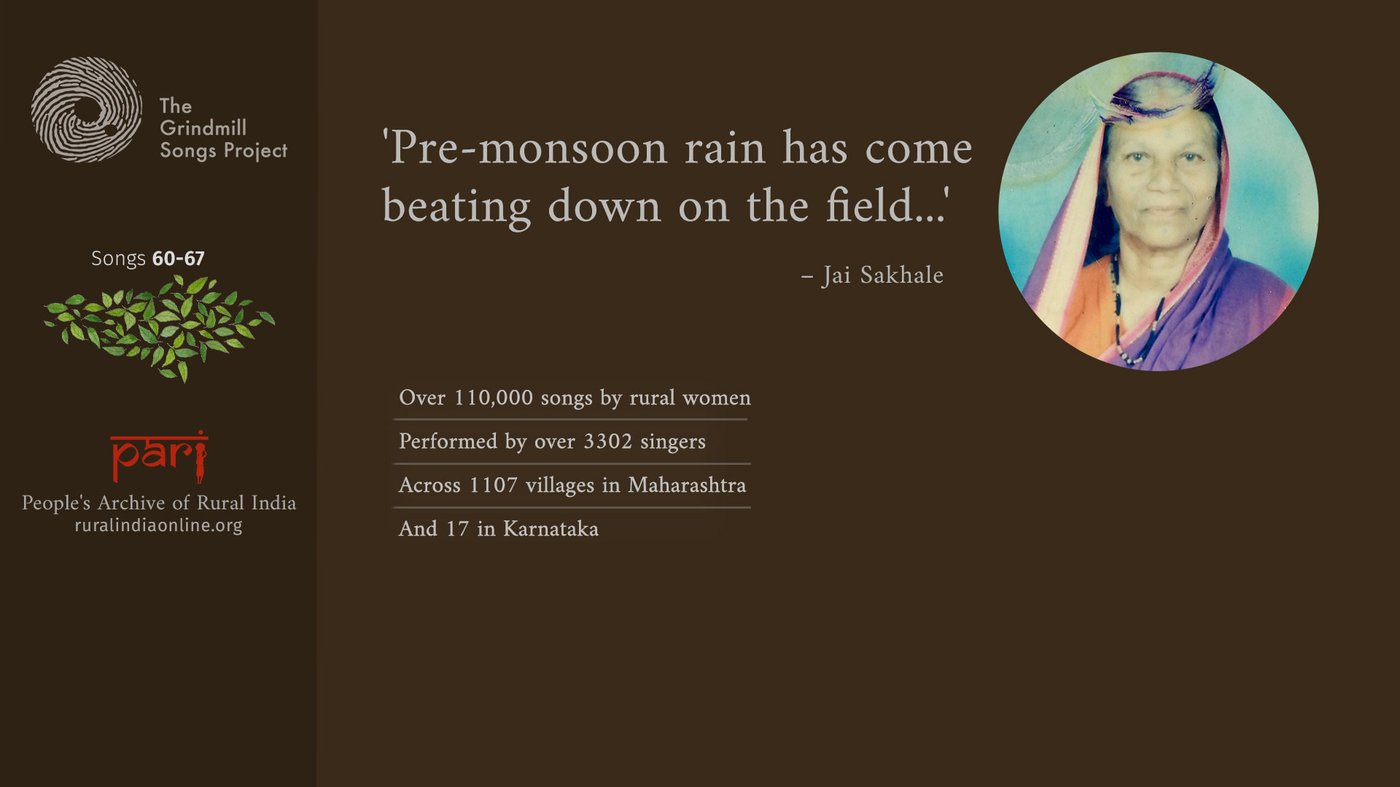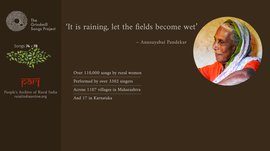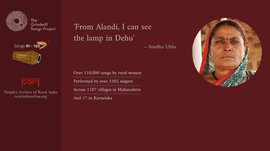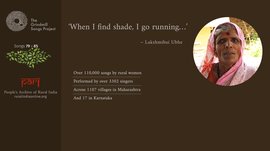This edition of the Grindmill Songs Project brings you melodies of the rains and fields, ploughing and sowing. It features eight audio couplets by Jai Sakhale and three video recordings by Chababai Mhapsekar/Sutar, both of Lawarde village, Mulshi taluka , Pune district
In the 27 constellations or nakshatra of Hindu astronomy, Rohini appears before Mriga, and both are associated with the rains. Rohini brings pre-monsoon showers while Mriga is believed to bring the monsoon rains, both very important for farmers and agriculture. Farmers plough the fields after the pre-monsoon showers, and follow that with sowing when monsoon begins. The earth gets heated during summer and the pre-monsoon showers moisten and cool the soil.
In rural folklore in some parts of Maharashtra, a sister and her brother symbolise the two nakshatra . Traditionally, the sister (Rohini) is married at a younger age and before the brother (Mriga). The sister thus has a child before the brother does. This comparison of the two nakshatra with male and female siblings forms an important and popular ovi in this edition of eight grindmill songs.
As many as 97 women from nearly as many different villages across Maharashtra sang this ovi for the Grindmill Songs Project . These audios were recorded between January 1996 and October 1999.
Jai Sakhale, one of the singers, died in 2012. The audios clips featured here are the ovi she sang when Bernard Bel and others of the Grindmill Songs Project team recorded them on October 5, 1999. When we re-visited Lawarde village in Mulshi taluka of Pune district on April 20, 2017, we met her daughter, Lila Shinde, who showed us a framed photograph of her mother Jai.
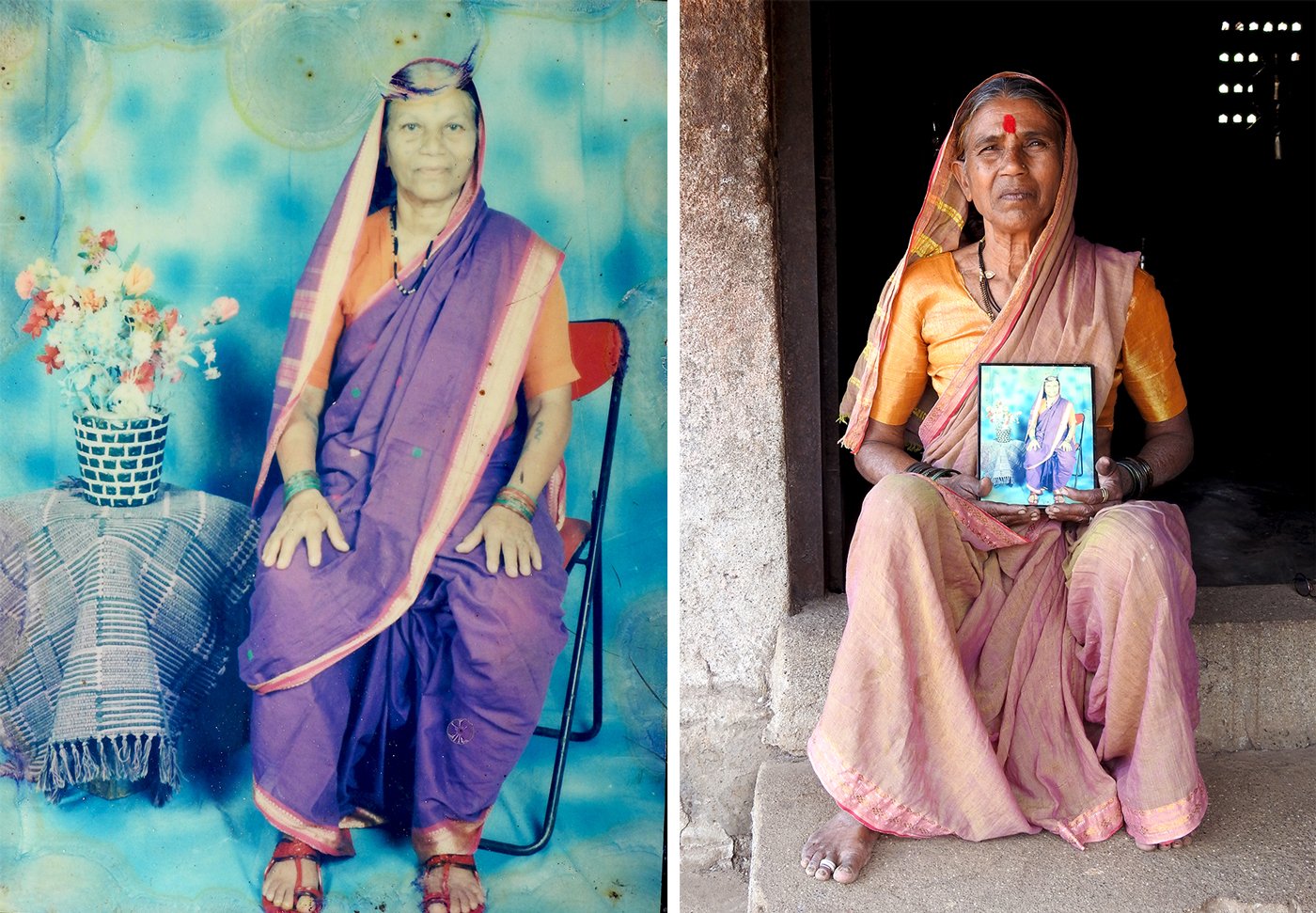
The late Jai Sakhale and (right) her daughter Lila Shinde with her mother's photograph
In the same village, we met Chababai Mhapsekar/Sutar, now 74 and one of the 11 singers from this village whose ovi are in the grindmill songs database. “I cannot remember the songs,” she said. When we asked if she remembered any ovi about summer rains, a few songs flowed forth easily.
The video featured here – recorded during our April 2017 visit – conveys Chababai’s exuberance and joy in singing grindmill songs after a long time.
We said goodbye to Chababai and her husband Gopal Sutar, who worked as a carpenter when he was younger, and went in search of another singer from the village.
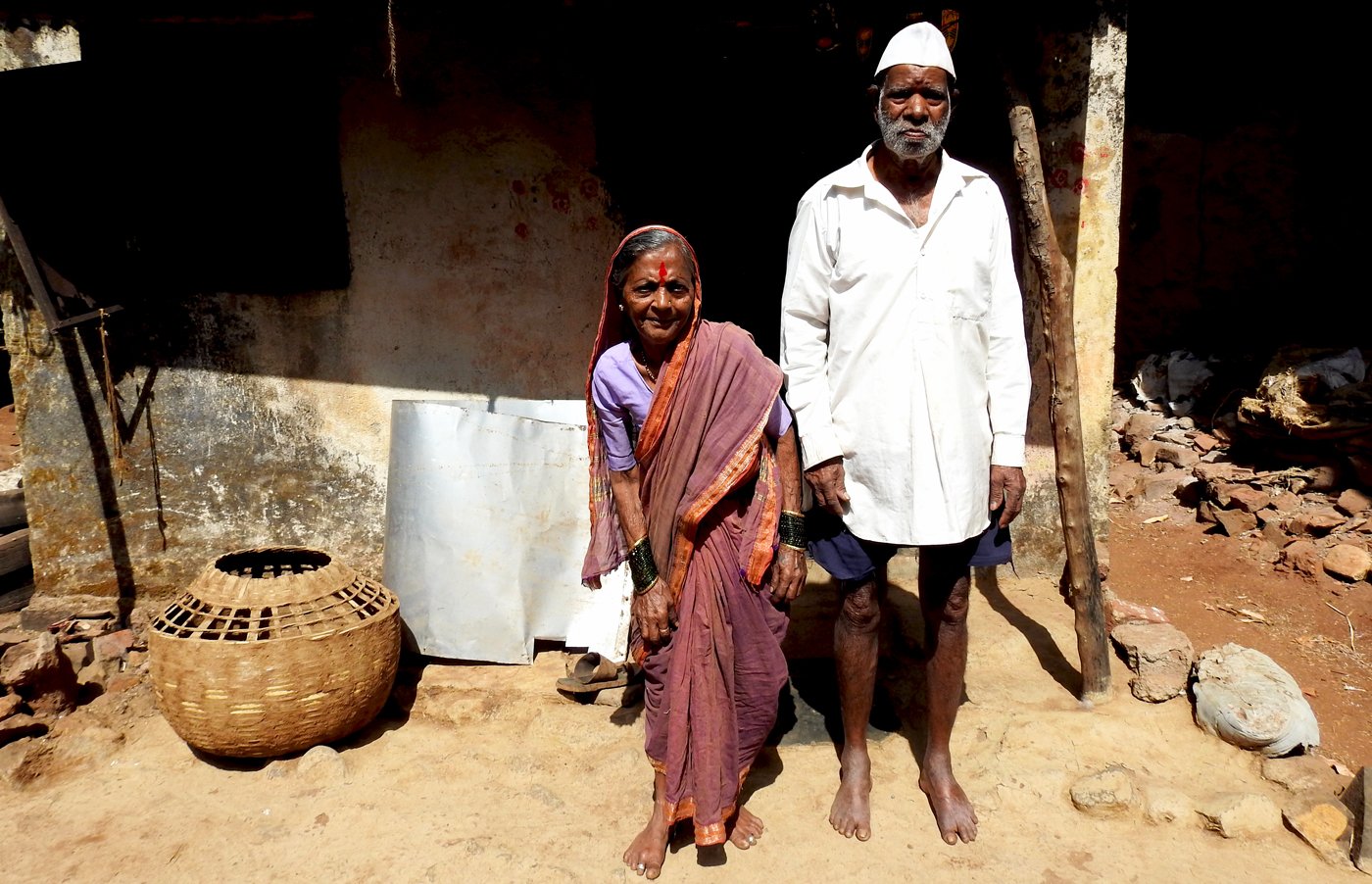
Chababai Mhapsekar/Sutar and her husband Gopal outside their home in Lawarde village
This edition of the Grindmill Songs on PARI features eight ovi by Jai Sakhale.
“It has been raining for a long time and my son has gone to the fields, sowing wheat using a drill-plough,” the singer says in the first song. The second is a variation of the first: it is raining and the son is sowing rice in the field.
In the third couplet too, the performer tells us that it is pouring from above and her sons have left for sowing.
In the fourth ovi , the popular rain song, the singer tells us that when it rains, the showers associated with the Rohini nakshatra fall before those influenced by the Mriga nakshatra ; (just as) a cradle rocks in the sister’s home before it does in the brother’s. (Pre-monsoon rain is associated with Rohini and monsoon with Mriga).
The fifth verse speaks of rains that are beating down on the fields, and the ploughman who runs the drill-plough under the jasmine tree.
In the sixth ovi , the performer sings that she cannot decide which field to go to because there are so many fields. She tells her son that they should plant a jasmine tree on the bund (which would help her to find their field easily).
When the singer reaches her son’s field in the seventh couplet, she stands there and asks him when he did all the work (indicating that her son is hardworking).
In the eighth song, the singer goes to the field carrying a jug for water (possibly rain water) and sings that before the bullocks, the water will go to her thirsty ploughman.
पाऊस ग पाडल्यानी फळी धरीली कवाशी
माझीया बाळाच्या शेती पाभर गव्हाची
पाऊसानी यानी फळी धरीली आताशी
माझीया बाळाच्या शेती पाभर भाताची
पाऊस यानी फळी धरीली वरुनी
माझी ना बाळ बाई निघाली पेरुनी
पाऊस पडतो मिरगा आधी रोहीणीचा
पाळणा हालतो भावाआधी बहिणीचा
वळीव पाऊस आला शिवार झोडीत
जाई झाडाखाली औत्या पाभार सोडीत
शेताआड शेत मी शेताला कंच्या जाऊ
सांगते बाळा तुला जाई बांधावरी लावू
शेताला जाईन उभी राहीन अधीमधी
सांगते बाळा तुला काम केल कधी
शेताला जाईन चरवी नेईन पाण्याला
बैलाच्या आधी माझा औत्या तान्हेला
pāūsa
ga pāḍalyānī phaḷī dharīlī kavāśī
mājhīyā bāḷācyā śētī pābhāra gavhācī
pāūsānī
yānī phaḷī dharīlī ātāśī
mājhīyā bāḷācyā śētī pābhara
bhātācī
pāūsa
yānī phaḷī dharīlī varunī
mājhī nā bāḷa
bāī nighālī pērunī
pāūsa
paḍatō miragā ādhī rōhīṇīcā
pāḷaṇā hālatō bhāvāādhī bahiṇīcā
vaḷīva pāūsa
ālā śivāra jhōḍīta
jāī jhāḍākhālī autyā pābhāra sōḍīta
śētāāḍa śēta mī śētālā kañcyā jāū
sāṅgatē bāḷā
tulā jāī bāndhāvarī lāvū
śētālā
jāīna aubhī rāhīna adhīmadhī
sāṅgatē bāḷā tulā kāma kēla kadhī
śētālā
jāīna caravī nēīna pāṇyālā
bailācyā ādhī mājhā
autyā tānhēlā
It has rained, it is raining continuously for long
My
son is cultivating the field, sowing wheat with the drill-plough
It has started raining continuously from above
O woman, my sons are leaving for sowing
[The constellation] Rohini brings
rain before [the constellation] Mriga
Sister’s cradle rocks before the
brother’s
Pre-monsoon rain has come beating
down on the field
Under the jasmine tree, the
ploughman is working with the drill-plough
One field after the other, to which
field should I go
I tell you, son, we shall plant jasmine
on the bund
I shall go to your field and stand
there
I ask you, son, when did you do this
work
I shall go to the field, I shall
take a jug for water
Before the bullocks, my ploughman is
thirsty
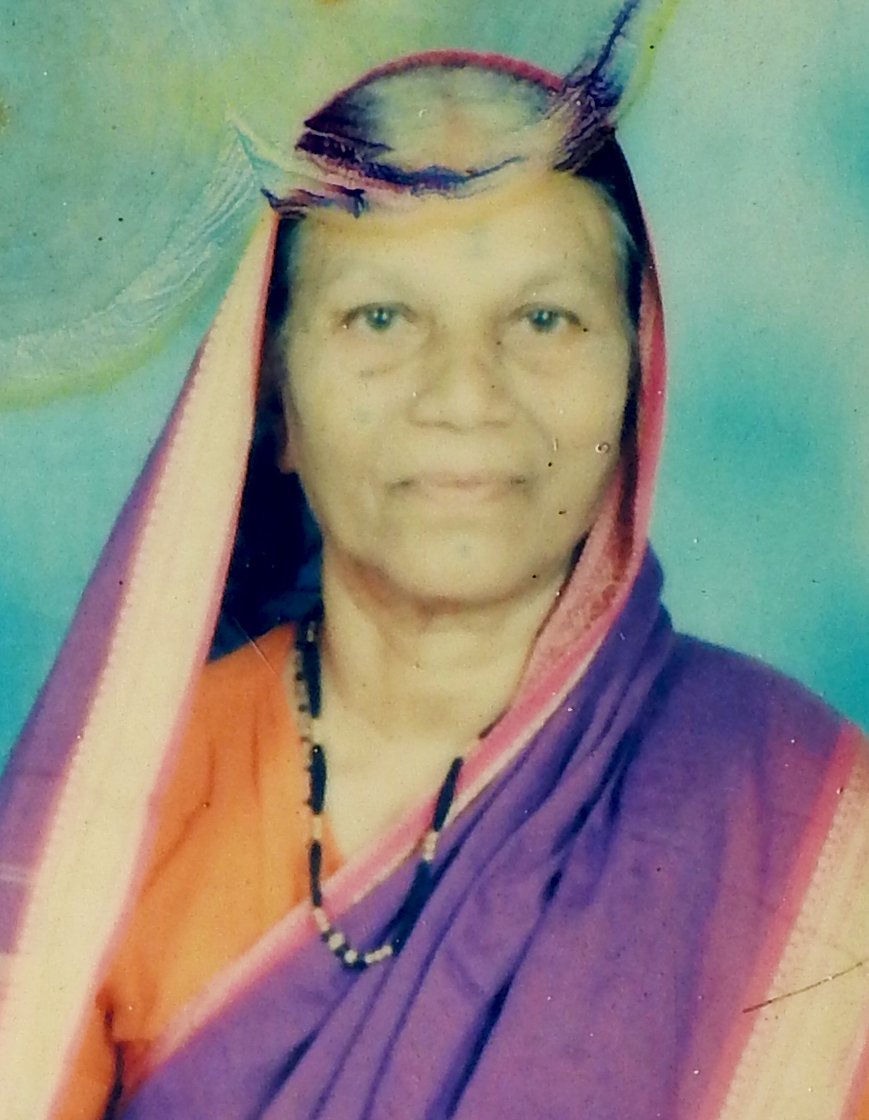
Performer/ Singer: Jai Sakhale
Village: Lawarde
Taluka: Mulshi
District: Pune
Caste: Nav Bauddha (Neo Buddhist)
Age: Died in 2012
Education: None
Children: 1 daughter
Date: Her songs were recorded on October 5, 1999
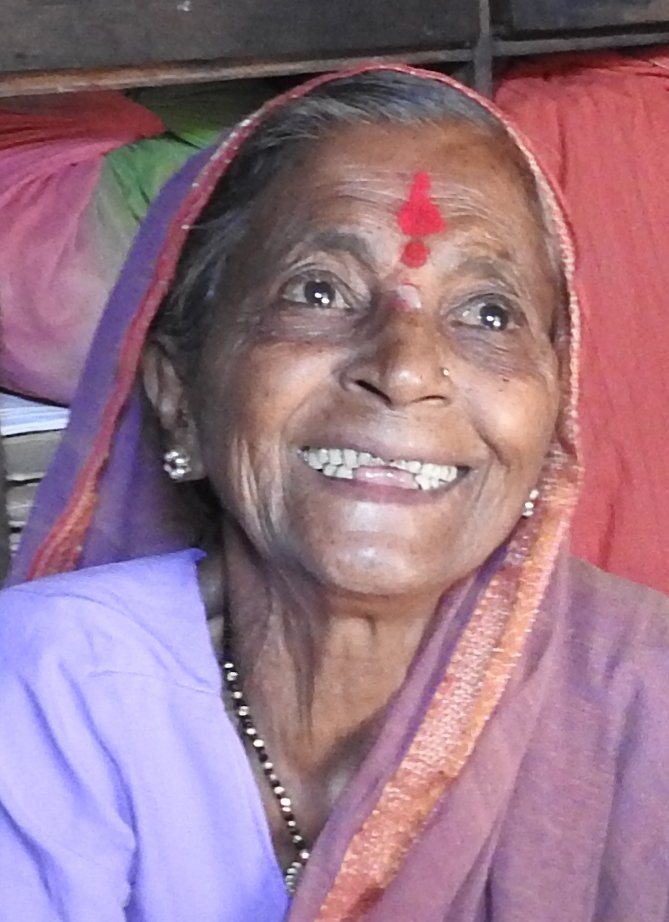
Performer/ Singer: Chababai Mhapsekar/ Sutar
Village: Lawarde
Taluka: Mulshi
District: Pune
Caste: Sutar
Age: 74
Education: None
Children: 1 daughter, 2 grandchildren
Occupation: Her husband worked as a carpenter in the village in exchange for grain ( baluta ). They grow rice on a two-acre farm, and make an additional income from a small flock of hens.
Date: The video was recorded on April 30, 2017
Poster: Shreya Katyayini
